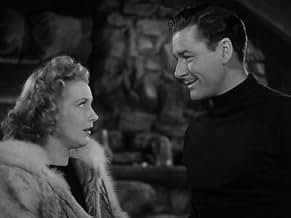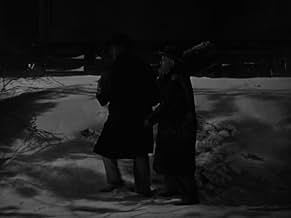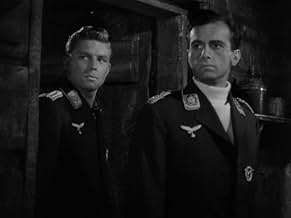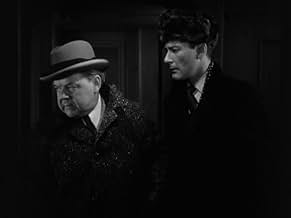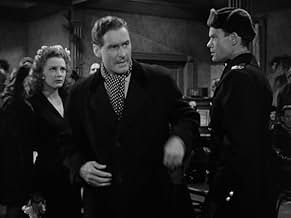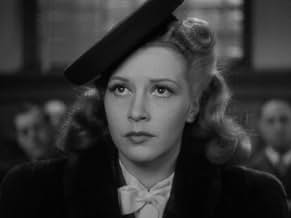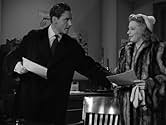Ajouter une intrigue dans votre langueA Canadian Mountie of German descent feigns disaffection with his homeland in hopes of infiltrating and thwarting a Nazi sabotage plot.A Canadian Mountie of German descent feigns disaffection with his homeland in hopes of infiltrating and thwarting a Nazi sabotage plot.A Canadian Mountie of German descent feigns disaffection with his homeland in hopes of infiltrating and thwarting a Nazi sabotage plot.
- Réalisation
- Scénario
- Casting principal
- Sergeant
- (scènes coupées)
- Jochim Preisser
- (non crédité)
- Orderly
- (non crédité)
- German Ski Trooper
- (non crédité)
- Nazi Prisoner
- (non crédité)
- Workman
- (non crédité)
- Nazi Prisoner
- (non crédité)
- Lodge Guest
- (non crédité)
- Winnipeg Police Desk Sergeant
- (non crédité)
Avis à la une
Adolph Deutsch scores a cleverly subtle soundtrack to raise the suspense quotient, as he did for "High Sierra" and "The Maltese Falcon". Just the "Kick 'em in the Axis" kind of movie to watch, if you've already seen and liked "Tartu" and "The Commandos Strike At Dawn".
A solid, serious film that shouts its political message too loudly, but is so unusual, and potentially scary it remains interesting for anyone into WWII films. Truly fascinating is the setting—the north woods of Canada in winter—and the involvement of Native Americans, who side with the Nazis for the simple reason that that means siding against Canada. (This is addressed in some brutal killings partway through.) The key plot idea is that a group of expert Nazis might actually sneak into remote areas of the country to perform acts of sabotage.
The movie audience here is mostly in the United States, to be sure (Canada's population is so small it is always a secondary concern from the studio's point of view). And the leading actor, Errol Flynn, takes on the larger issues well. That is: devotion to good, personal sacrifice to defeat the enemy, and providing an example of moral uncertainty resolving itself as the circumstances become clear. The issues he faces (in Canada) applied to the U.S. equally.
Canada, to be sure, entered the war officially with Great Britain in 1939. But by 1943 the U.S. was also officially fighting. Cooperation between the two neighbors was a given, overall, but they had different national priorities to smooth out. Flynn was so famous at the time, despite (or because of) some personal scandal, he carried the movie.
But it's cobbled together stuff, quasi-propaganda. None of it was shot in Canada, though it's convincing enough. The romance is really almost superfluous, but it gives of course the audience that extra layer to swoon about, briefly. Most viewers will find a lot of this formulaic and rough sledding, but it isn't terrible, and the themes have lasting power.
"Northern Pursuit" isn't the best of his movies, but it is Flynn at his best. He looks in great shape despite the fact that he had a dicky ticker, a bad back, tuberculosis, a couple of exotic diseases picked up along the way and a liver that was in more danger of destruction than any target of the Nazis in the film.
Set in Canada during WW2, Errol plays Steve Wagner, a Royal Canadian Mountie of German Ancestry whose loyalty is questioned when he comes across Nazi secret agents who are planning to bomb a canal that is critical to the Allied war effort.
Although the story feels cobbled together, the film looks good. Most of it was shot on the sound stage and no doubt a great deal of talcum powder and papier mache was employed, but the sequence where a U-Boat breaks through the ice and scenes such as the avalanche are brilliantly staged.
However the stars make the film. Although Errol was rarely upstaged, Helmut Dantine was Warner's go-to Nazi guy during the war years. He plays Colonel Hugo von Keller in this film. The reason why Dantine was more effective than many screen Nazis at the time was the degree of intelligence with which he approached his roles. He was no off-the-rack, monocled Nazi stereotype, he came across as vigorous, smart and fanatical; a formidable enemy, he was also good looking and often got the best lines.
If you like the stars, and Flynn was absolutely unique, then there is much to enjoy here. In fact the film was a bit of a turning point for him- he even got a laugh with an in-joke at the end alluding to his recent acquittal on rape charges. From that point on he went along with the joke about his sexual prowess although those who knew him felt that it hurt his desire to be taken seriously as an actor.
Finally, for anyone with a sense of history, "Northern Pursuit" is a fascinating insight into what audiences were watching during the war even if they took it all with a generous pinch of salt.
I found it very suspenseful.
If you try viewing it as the original, intended audience did back in 1943, when the U.S. was not winning the war in Europe and there were fears of German infiltration everywhere, you can imagine how relevant this story would have been to audiences.
Tension is maintained for much of the movie by keeping us in suspense regarding Flynn's character's allegiances. No, of course we can't believe he's really a Nazi, but for the first half of the movie, it certainly seems as if he might be.
I was surprised, and thrown off guard, by the number of "good guys" who got killed in this movie. That made it seem more real to me.
The last scene is pure Hollywood, and pure corn. But up until then, there is a lot to admire and enjoy in this movie.
Le saviez-vous
- AnecdotesErrol Flynn was criticized for playing heroes in World War II movies. Tony Thomas in his book "Errol Flynn: The Spy Who Never Was" states that Flynn had tried to enlist in every branch of the armed services but was rejected as unfit for service on the grounds of his health--he had a heart condition, tuberculosis, malaria and a back problem. He felt he could contribute to America's war effort by appearing in such films as L'ange des ténèbres (1943), Du sang sur la neige (1943), Bombardiers en piqué (1941), Aventures en Birmanie (1945) and Saboteur sans gloire (1944). Reportedly, he was at his most professional and cooperative while working on these movies. Warner Bros. apparently did not discuss the state of his health, as it wished to keep it quiet for fear that it would damage his box-office draw.
- GaffesNear the end the Nazis' plane is shown spiraling over and over in exterior shots, but in shots in the plane's interior it's going straight down, not spinning out of control.
- Citations
Angus McBain: I have a very derogatory opinion of policeman, in general, and Steve, in particular.
Laura McBain: You're not going to marry him, I am.
Angus McBain: McBain's daughter the wife of a policeman! McBain's daughter stuck in a tradin' post!
Laura McBain: What makes McBain's daughter so wonderful?
Angus McBain: McBain!
- ConnexionsFeatured in Hollywood on Trial (1976)
- Bandes originalesThe Bonnie Banks O' Loch Lomond
(ca 1745) (uncredited)
Lyrics by Robert Burns
Played off-screen on piano at the hotel
Meilleurs choix
- How long is Northern Pursuit?Alimenté par Alexa
Détails
Box-office
- Budget
- 1 290 000 $US (estimé)
- Durée1 heure 33 minutes
- Couleur
- Rapport de forme
- 1.37 : 1
Contribuer à cette page



